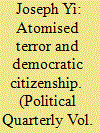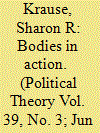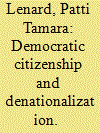|
|
|
Sort Order |
|
|
|
Items / Page
|
|
|
|
|
|
|
| Srl | Item |
| 1 |
ID:
123776


|
|
|
|
|
| Publication |
2013.
|
| Summary/Abstract |
This essay connects the 2103 Boston Bombings to the dynamics of a highly individualist, modern society. The perpetrators (Tsarnaev brothers) represent an atomized stratum of Americans, disconnected from communal institutions and organizations; socially insignificant men, ready to commit publicized, albeit isolated, acts of violence. With the exception of the World Trade Center, major terrorist attacks in the past two decades have been perpetrated by asocial, isolated individuals. An expansive security and welfare state is an inadequate response to atomized terror and is potentially problematic for our liberties. An approach more consistent with security and freedom is to nurture the rights and responsibilities of democratic citizenship.
|
|
|
|
|
|
|
|
|
|
|
|
|
|
|
|
| 2 |
ID:
105921


|
|
|
|
|
| Publication |
2011.
|
| Summary/Abstract |
A better appreciation of the material, distributed quality of human agency can illuminate subtle dynamics of domination and oppression and reveal resources for potentially liberatory political action. Materialist accounts of agency nevertheless pose challenges to the notion of personal responsibility that is so crucial to political obligation and democratic citizenship. To guard against this danger, we need to sustain the close connection between agency and a sense of selfhood that is individuated, reflexive, and responsive to norms. Yet we should acknowledge that reflexive selfhood is not the whole of individual agency for the sources of agency extend beyond the individual herself. We also need to recognize the ways that both reflexivity and norm-responsiveness are themselves embodied capacities. When properly conceived, a materialist view of agency can increase awareness of our often-unwitting contributions to systematic inequalities of power and extend our political responsibilities in emancipatory directions, thus holding great promise for democratic
|
|
|
|
|
|
|
|
|
|
|
|
|
|
|
|
| 3 |
ID:
162663


|
|
|
|
|
| Summary/Abstract |
The behavioral sciences are playing an increasingly important role in the design and implementation of public policy worldwide. While there have been several important critiques of the latest policy revolution linking the behavioral sciences and the state in the pursuit of human behavioral change, few scholars have investigated the potential costs of “nudging” for democratic citizenship and the deliberative capacities upon which democratic self-governance relies. A central purpose here is to consider the possible civic consequences of nudging within the pursuit of otherwise desirable social outcomes (like improved public health, energy conservation, or higher rates of financial saving). Through a critical investigation of the governing philosophy of the “nudging state” and drawing on the policy feedback literature, I argue that the recent behavioral turn in public policy risks overlooking or bypassing the personal capacities and institutional conditions necessary for the meaningful exercise of democratic citizenship. Evidence from the empirical assessment of deliberative democracy shows how liberal societies can fruitfully address bounded rationality while facilitating civic virtues like public practical reason without violating liberty or constraining pluralism.
|
|
|
|
|
|
|
|
|
|
|
|
|
|
|
|
| 4 |
ID:
121133


|
|
|
|
|
| Publication |
2012.
|
| Summary/Abstract |
Freedom as non-domination has acquired a leading status in political science. As a consequence of its success, neo-roman republicanism also has achieved great prominence as the political tradition that delivered it. Yet despite the fact that liberty in the Roman mode was forged not only in direct confrontation with monarchy but against democracy as well, the relationship of republicanism to democracy is the great absentee in the contemporary debate on non-domination. This article brings that relationship back into view in both historical and conceptual terms. It illustrates the misrepresentations of democracy in the Roman tradition and shows how these undergirded the theory of liberty as non-domination as a counter to political equality as a claim to taking part in imperium. In so doing it brings to the fore the "liberty side" of democratic citizenship as the equal rights of all citizens to exercise their political rights, in direct or indirect form.
|
|
|
|
|
|
|
|
|
|
|
|
|
|
|
|
| 5 |
ID:
158489


|
|
|
|
|
| Summary/Abstract |
Are democratic states permitted to denationalize citizens, in particular those whom they believe pose dangers to the physical safety of others? In this article, I argue that they are not. The power to denationalize citizens—that is, to revoke citizenship—is one that many states have historically claimed for themselves, but which has largely been in disuse in the last several decades. Recent terrorist events have, however, prompted scholars and political actors to reconsider the role that denationalization can and perhaps should play in democratic states, in particular with respect to its role in protecting national security and in supporting the global fight against terror more generally. In this article, my objective is to show that denationalization laws have no place in democratic states. To understand why, I propose examining the foundations of the right of citizenship, which lie, I shall argue, in the very strong interests that individuals have in security of residence. I use this formulation of the right to respond to two broad clusters of arguments: (1) those that claim that it is justifiable to denationalize citizens who threaten to undermine the safety of citizens in a democratic state or the ability of a democratic state to function as a democratic state, and (2) those that claim that it is justifiable to denationalize dual citizens because they possess citizenship status in a second country that is also able to protect their rights.
|
|
|
|
|
|
|
|
|
|
|
|
|
|
|
|
|
|
|
|
|